《桃花源记》中英文对照
- 格式:doc
- 大小:42.50 KB
- 文档页数:6
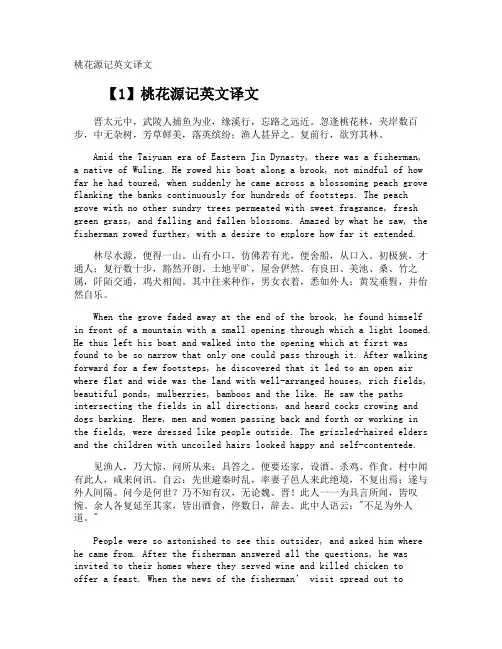
桃花源记英文译文【1】桃花源记英文译文晋太元中,武陵人捕鱼为业,缘溪行,忘路之远近。
忽逢桃花林,夹岸数百步,中无杂树,芳草鲜美,落英缤纷;渔人甚异之。
复前行,欲穷其林。
Amid the Taiyuan era of Eastern Jin Dynasty, there was a fisherman,a native of Wuling. He rowed his boat along a brook, not mindful of how far he had toured, when suddenly he came across a blossoming peach grove flanking the banks continuously for hundreds of footsteps. The peach grove with no other sundry trees permeated with sweet fragrance, fresh green grass, and falling and fallen blossoms. Amazed by what he saw, the fisherman rowed further, with a desire to explore how far it extended.林尽水源,便得一山。
山有小口,仿佛若有光,便舍船,从口入。
初极狭,才通人;复行数十步,豁然开朗。
土地平旷,屋舍俨然。
有良田、美池、桑、竹之属,阡陌交通,鸡犬相闻。
其中往来种作,男女衣着,悉如外人;黄发垂髫,并佁然自乐。
When the grove faded away at the end of the brook, he found himself in front of a mountain with a small opening through which a light loomed. He thus left his boat and walked into the opening which at first was found to be so narrow that only one could pass through it. After walking forward for a few footsteps, he discovered that it led to an open air where flat and wide was the land with well-arranged houses, rich fields, beautiful ponds, mulberries, bamboos and the like. He saw the paths intersecting the fields in all directions, and heard cocks crowing and dogs barking. Here, men and women passing back and forth or working in the fields, were dressed like people outside. The grizzled-haired elders and the children with uncoiled hairs looked happy and self-contentede.见渔人,乃大惊,问所从来;具答之。
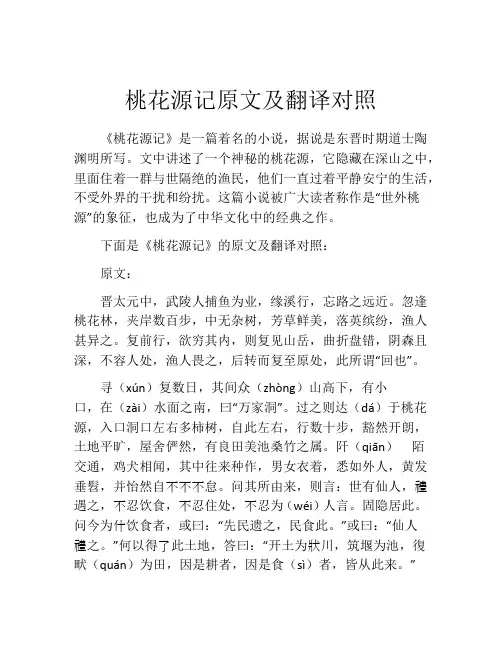
桃花源记原文及翻译对照《桃花源记》是一篇着名的小说,据说是东晋时期道士陶渊明所写。
文中讲述了一个神秘的桃花源,它隐藏在深山之中,里面住着一群与世隔绝的渔民,他们一直过着平静安宁的生活,不受外界的干扰和纷扰。
这篇小说被广大读者称作是“世外桃源”的象征,也成为了中华文化中的经典之作。
下面是《桃花源记》的原文及翻译对照:原文:晋太元中,武陵人捕鱼为业,缘溪行,忘路之远近。
忽逢桃花林,夹岸数百步,中无杂树,芳草鲜美,落英缤纷,渔人甚异之。
复前行,欲穷其内,则复见山岳,曲折盘错,阴森且深,不容人处,渔人畏之,后转而复至原处,此所谓“回也”。
寻(xún)复数日,其间众(zhòng)山高下,有小口,在(zài)水面之南,曰“万家洞”。
过之则达(dá)于桃花源,入口洞口左右多柿树,自此左右,行数十步,豁然开朗,土地平旷,屋舍俨然,有良田美池桑竹之属。
阡(qiān)陌交通,鸡犬相闻,其中往来种作,男女衣着,悉如外人,黄发垂髫,并怡然自不不不怠。
问其所由来,则言:世有仙人,禮遇之,不忍饮食,不忍住处,不忍为(wéi)人言。
固隐居此。
问今为什饮食者,或曰:“先民遗之,民食此。
”或曰:“仙人禮之。
”何以得了此土地,答曰:“开土为狀川,筑堰为池,復畎(quán)为田,因是耕者,因是食(sì)者,皆从此来。
”自非童子詹(zhān),亦无所出入之意。
乃凿壁穴,引泉出其西南,云:“此亦仙人所为。
”借问洞中何所有?曰:“有二石缝中流出,皆食之无饥渴。
”自其垄断,不知凡几年矣。
设灶,庖(páo)厨具备,饮食自若。
往来种作,男女无别,衣服颜色一也.Translation:During the Taiyuan period of the Jin Dynasty, people in Wuling made their living by fishing. They followed the river in all directions, forgetting the distance of the road. Suddenly, they came across a peach blossom forest, with the banks of the river stretching for hundreds of steps with no miscellaneous trees. The fragrant grass was refreshing and charming, and the fallen petals were swirling and beautiful. The fishermen were amazed. Further ahead, they wanted to explore it, but saw the mountains and twists and turns, which were gloomy and deep and unsuitable for people. The fishermen were afraid, so they turned back and returned to the original place which was called "turning back".After a few days of searching, there were high and low mountains in between, there was a small opening on the south side of the waterway, called "Wanjiadong". Passing through it, they reached the Peach Blossom Spring. At the entrance, there were many persimmon trees on the left and right. After walking for tens of steps, it suddenly became open and the land was flat. The houses were neat and tidy, and there were good fields, beautiful pools, mulberries and bamboos. Roads crossed eachother, and chickens and dogs could be heard. The people cameand went and were busy with planting. The men and women were all dressed like outsiders, with yellow hair and braids, and they looked at ease. When they were asked about their origins, they said that there was an immortal person in the world who met them, and he could not bear to eat or live, or to speak for others. So they lived in seclusion here. When asked about their food and drink these days, some said: "This is the legacy of the first generation, and the people eat it." Some said: "The immortal person offered it as a gift." When asked how they got this land, they answered: "The soil was opened up to become a river, the weir was built to become a pool, and the field was farmed again. Since then, those who cultivate the land, those who eat, have all come from here."Excluding the boy called Zhansui, they had no intention of leaving or coming in. They even dug a cave and pulled out a spring from the southwest, saying: "This is also done by the immortal person." When asked about what was in the cave, someone said: "There are two stones with a crack in the middle from whichwater flows out. Those who eat them will never have hunger or thirst." Since then, no one has disputed this and it has been years. They set up a stove, and the kitchen was well-equipped. They ate and drank with ease. They planted and worked without any gender distinction, and their clothes were all the same color.历经千年,虽然《桃花源记》的幻境已不再,但是它所诠释的“桃花源”意识却一直在中华文化中发扬光大。
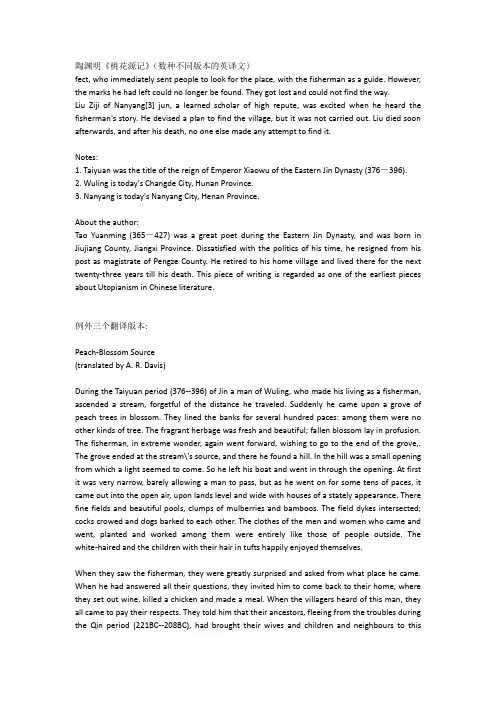
陶渊明《桃花源记》(数种不同版本的英译文)fect, who immediately sent people to look for the place, with the fisherman as a guide. However, the marks he had left could no longer be found. They got lost and could not find the way.Liu Ziji of Nanyang[3] jun, a learned scholar of high repute, was excited when he heard the fisherman's story. He devised a plan to find the village, but it was not carried out. Liu died soon afterwards, and after his death, no one else made any attempt to find it.Notes:1. Taiyuan was the title of the reign of Emperor Xiaowu of the Eastern Jin Dynasty (376-396).2. Wuling is today's Changde City, Hunan Province.3. Nanyang is today's Nanyang City, Henan Province.About the author:Tao Yuanming (365-427) was a great poet during the Eastern Jin Dynasty, and was born in Jiujiang County, Jiangxi Province. Dissatisfied with the politics of his time, he resigned from his post as magistrate of Pengze County. He retired to his home village and lived there for the next twenty-three years till his death. This piece of writing is regarded as one of the earliest pieces about Utopianism in Chinese literature.例外三个翻译版本:Peach-Blossom Source(translated by A. R. Davis)During the Taiyuan period (376--396) of Jin a man of Wuling, who made his living as a fisherman, ascended a stream, forgetful of the distance he traveled. Suddenly he came upon a grove of peach trees in blossom. They lined the banks for several hundred paces: among them were no other kinds of tree. The fragrant herbage was fresh and beautiful; fallen blossom lay in profusion. The fisherman, in extreme wonder, again went forward, wishing to go to the end of the grove,. The grove ended at the stream\'s source, and there he found a hill. In the hill was a small opening from which a light seemed to come. So he left his boat and went in through the opening. At first it was very narrow, barely allowing a man to pass, but as he went on for some tens of paces, it came out into the open air, upon lands level and wide with houses of a stately appearance. There fine fields and beautiful pools, clumps of mulberries and bamboos. The field dykes intersected; cocks crowed and dogs barked to each other. The clothes of the men and women who came and went, planted and worked among them were entirely like those of people outside. The white-haired and the children with their hair in tufts happily enjoyed themselves.When they saw the fisherman, they were greatly surprised and asked from what place he came. When he had answered all their questions, they invited him to come back to their home, where they set out wine, killed a chicken and made a meal. When the villagers heard of this man, they all came to pay their respects. They told him that their ancestors, fleeing from the troubles during the Qin period (221BC--208BC), had brought their wives and children and neighbours to thisinaccessible spot and had not gone out again. Thus they became cut off from陶渊明《桃花源记》(数种不同版本的英译文)people outside. They asked what dynasty it was now: they did not know that there had been Han (206 BC--220AD, nor of courts Wei (220--265AD) or Jin. The fisherman told them all he knew, item by item, and at everything they sighed with grief. The others in turn also invited him to their homes, and all set out wine and food. He stayed for several days and then took leave of them. The people of this place said to him: "You should not speak of this to those outside."When he had gone out, he found his boat and folllowed the route by which he had come: everywhere he noted the way. When he reached the commandery, he called on the prefect and told him this story. The prefect immediately sent a man to go with him and seek out the places he had previously noted, but they went astray and could not find the way again.Liu Ziji of Nanyang, who was a scholar of lofty ideals, heard of it and joyfully planned to go. Soon after, before he had carried out his plan, he fell ill and died. Afterwards there was no one who "sought the ford".The Peach Colony(translated by Lin Yutang 林语堂)During the reign of Taiyuan of Chin, there was a fisherman of Wuling. One day he was walking along a bank. After having gone a certain distance, he suddenly came upon a peach grove which extended along the bank for about a hundred yards. He noticed with surprise that the grove had a magic effect, so singularly free from the usual mingling of brushwood, while the beautifully grassy ground was covered with its rose petals. He went further to explore, and when he came to the end of the grove, he saw a spring which came from a cave in the hill, Having noticed that there seemed to be a weak light in the cave, he tied up his boat and decided to go in and explore.At first the opening was very narrow, barely wide enough for one person to go in. After a dozen steps, it opened into a flood of light. He saw before his eyes a wide, level valley, with houses and fields and farms. There were bamboos and mulberries; farmers were working and dogs and chickens were running about. The dresses of the men and women were like those of the outside world, and the old men and children appeared very happy and contented. They were greatly astonished to see the fisherman and asked him where he had come from. The fisherman told them and was invited to their homes, where wine was served and chicken was killed for dinner to entertain him. The villagers hearing of his coming all came to see him and to talk. They said that their ancestors had come here as refugees to escape from the tyranny of Tsin Shih-huang (builder of Great Wall) some six hundred years ago, and they had never left it. They were thus completely cut off from the world, and asked what was the ruling dynasty now. They had not even heard of the Han Dynasty (two centuries before to two centuries after Christ), not to speak of the Wei (third century A.D.) and the Chin (third and fourth centuries). The fisherman told陶渊明《桃花源记》(数种不同版本的英译文)them, which they heard with great amazement. Many of the other villagers then began to invite him to their homes by turn and feed him dinner and wine.After a few days, he took leave of them and left. The villagers begged him not to tell the people outside about their colony. The man found his boat and came back, marking with signs the routehe had followed. He went to the magistrate\'s office and told the magistrate about it. The latter sent someone to go with him and find the place. They looked for the signs but got lost and could never find it again. Liu Tsechi of Nanyang was a great idealist. He heard of this story, and planned to go and find it, but was taken ill and died before he could fulfill his wish. Since then, no one has gone in search of this place.Peach-Blossom Springs。

桃花源记四种英译文桃花源记四种英译文《桃花源记》通过对桃花源的安宁和乐、自由平等生活的描绘,表现了作者追求美好生活的理想和对现实生活的不满。
下面整理了桃花源记四种英译文,希望对您有帮助~《桃花源记》原文桃花源记晋太元中,武陵人捕鱼为业。
缘溪行,忘路之远近。
忽逢桃花林,夹岸数百步,中无杂树,芳草鲜美,落英缤纷。
渔人甚异之。
复前行,欲穷其林。
林尽水源,便得一山。
山有小口,仿佛若有光,便舍船,从口入。
初极狭,才通人。
复行数十步,豁然开朗。
土地平旷,屋舍俨然。
有良田美池桑竹之属;阡陌交通,鸡犬相闻。
其中往来种作,男女衣着,悉如外人;黄发垂髫,并佁然自乐。
见渔人,乃大惊,问所从来;具答之。
便要还家,设酒,杀鸡,作食。
村中闻有此人,咸来问讯。
自云先世避秦时乱,率妻子邑人来此绝境,不复出焉,遂与外人间隔。
问今是何世?乃不知有汉,无论魏晋。
此人一一为具言所闻,皆叹惋。
馀人各复延至其家,皆出酒食,停数日,辞去。
此中人语云:“不足为外人道也。
”既出,得其船,便扶向路,处处志之。
及郡下,诣太守,说如此。
太守即遣人随其往,寻向所志,遂迷不复得路。
南阳刘子骥,高尚士也,闻之,欣然规往,未果,寻病终。
后遂无问津者。
译文1:(translated and proofed by Rick Davis and David Steelman)Peach Blossom Shangri-laDuring the Taiyuan era of the Jin Dynasty there was a man of Wuling who made his living as a fisherman. Once while following a stream he forgot how far he had gone. He suddenly came to agrove of blossoming peach trees. It lined both banks for several hundred paces and included not a single other kind of tree. Petals of the dazzling and fragrant blossoms were falling everywhere in profusion. Thinking this place highly unusual, the fisherman advanced once again in wanting to see how far it went.The peach trees stopped at the stream's source, where the fisherman came to a mountain with a small opening through which it seemed he could see light. Leaving his boat, he entered the opening. At first it was so narrow that he could barely pass, but after advancing a short distance it suddenly opened up to reveal a broad, flat area with imposing houses, good fields, beautiful ponds, mulberry trees, bamboo, and the like. The fisherman saw paths extending among the fields in all directions, and could hear the sounds of chickens and dogs. Men and women working in the fields all wore clothing that looked like that of foreign lands. The elderly and children all seemed to be happy and enjoying themselves.The people were amazed to see the fisherman, and they asked him from where he had come. He told them in detail, then the people invited him to their home, set out wine, butchered a chicken, and prepared a meal. Other villagers heard about the fisherman, and they all came to ask him questions. Then the villagers told him, 'To avoid the chaos of war during the Qin Dynasty, our ancestors brought their families and villagers to this isolated place and never left it, so we've had no contact with the outside world.' They asked the fisherman what the present reign was. They were not even aware of the Han Dynasty, let alone the Wei and Jin.The fisherman told them everything he knew in great detail, and the villagers were amazed and heaved sighs. Then other villagers also invited the fisherman to their homes, wherethey gave him food and drink. After several days there,the fisherman bid farewell, at which time some villagers told him, 'It's not worth telling people on the outside about us.'The fisherman exited through the opening, found his boat, and retraced his route while leaving markers to find this place again. Upon his arrival at the prefecture town he went to the prefect and told him what had happened. The prefect immediately sent a person to follow the fisherman and look for the trail markers, but they got lost and never found the way.Liu Ziji of Nanyang was a person of noble character. When he heard this story he was happy and planned to visit the Shangri-la, but he died of illness before he could accomplish it. After that no one else ever looked for the place.译文2:(translated by杨宪益)In the reign of Taiyuan of Jin Dynasty, there was a man of Wuling who was a fisherman by trade. One day he was fishing up a stream in his boat, heedless of how far he had gone, when suddenly he came upon a forest of peach trees.On either bank for several hundred yards there were no other kinds of tree. The fragrant grass was beautiful to look at, all patterned with fallen blossoms. The fisherman was extremely surprised and went on further, determined to get to the end of this wood. At the end of the wood he found the source of the stream and, at the foot of a cliff, there was a small cave in which there seemed to be a faint light. He left his boat and went into themouth of the cave.At first it was very narrow, only wide enough for a man, but after forty or fifty yards he suddenly found himself in the open. The place he had come to was level and spacious. There were houses and cottages arranged in a planned order; there were finefields and beautiful pools; there were mulberry trees, bamboo groves, and many other kinds of trees as well.There were raised pathways round the fields; and he heard the fowls crowing and dogs barking. Going to and froin all this, and busied in working and planting, were people, both men and women. Their dress was not unlike that of people outside, and all of them, whether old people with while hair or children with their hair tied in a knot, were happy and content with themselves.Seeing the fisherman, they were greatly amazed and asked him where he had come from. He answered all theirquestions, and then they invited him to their homes, where they put wine beforehim, killed chickens and prepared food in his honor. When the other people inthe village heard about the visitor, they too all came to ask questions.They themselves told him thattheir ancestors had escaped from the wars and confusion in the time of QinDynasty. Bring their wives and children, the people of their area had reached this isolated place, and had stayed here ever since. Thus they had lost all contact with the outside world.They asked what dynasty it was now. The Han they had never heard of, let alone the Wei and the Jin. Point by point the fisherman explained all he could of the world that he knew, and they all sighed in deep sorrow.Afterwards all the rest invitedhim to their homes, and all feasted him with wine and food. He stayed there several days and then bade them goodbye; before he departed these people said to him: “Never speak to anyone outside about this!” so he went out, found his boat and went back by the same route as he had come, all along the way leaving marks.When he got to the provincial town he called on the prefectand told him all about his experience. The prefect at once sent men to go with him and follow up the marks he had left. But they became completely confused over the marks and never found the place.Liu Ziji, a scholar of high reputation from Nanyang, heard of this and enthusiastically offered to go out with the fisherman to try again. But he fell ill and died before realizing hisplan. After that on one went any more to look for the way.译文3:The Peach Colony (translated by林语堂)During the reign of Taiyuan of Chin, there was a fisherman of Wuling. One day he was walking along a bank. After having gone a certain distance, he suddenly came upon a peach grove which extended along the bank for about a hundred yards. He noticed with surprise that the grove had a magic effect, so singularly free from the usual mingling of brushwood, while the beautifully grassy ground was covered with its rose petals. He went further to explore, and when he came to the end of the grove, he saw a spring which came from a cave in the hill. Having noticed that there seemed to be a weak light in the cave, he tied up his boat and decided to go inand explore. At first the opening was very narrow, barely wide enough for one person to go in. After a dozen steps, it opened into a flood of light. He saw before his eyes a wide, level valley, with houses and fields and farms. There were bamboos and mulberries; farmers were working and dogs and chickens were running about. The dresses of the men and women were like those of the outside world, and the old men and children appeared very happy and contented. They were greatly astonished to see the fisherman and asked him where he had come from. The fisherman told them and was invited to their homes, where wine was served and chicken was killed for dinnerto entertain him. The villagers hearing of his coming all came to see him and to talk. They said that their ancestors had come here as refugees to escape from the tyranny of Tsin Shih-huang (builder of Great Wall) some six hundred years ago, and they had never left it. They were thus completely cut off from the world, and asked what was the ruling dynasty now. They had not even heard of the Han Dynasty (two centuries before to two centuries after Christ), not to speak of the Wei (third century A.D.)and the Chin (third and fourth centuries). The fisherman told them, which they heard with great amazement. Many of the other villagers then began to invite him to their homes by turn and feed him dinner and wine. After a few days, he took leave of them and left. The villagers begged him not to tell the people outside about their colony. The man found his boat and came back, marking with signs the route he had followed. He went to the magistrate's office and told the magistrate about it. The latter sent someone to go with him and find the place. They looked for the signs but got lost and could never find it again.Liu Tsechi of Nanyang was a great idealist. He heard of this story, and planned to go and find it, but was taken ill and died before he could fulfill his wish. Since then, no one has gone in search of this place.译文4:(translated by Hightower James)During the Tai-yuan period of the China dynasty a fisherman of Wu-ling once rowed upstream, unmindful of the distance he had gone, when he suddenly came to a grove of peach trees in bloom. For several hundred paces on both banks of the stream there was no other kind of tree. The wild flowers growing under them were fresh and lovely, and fallen petals covered the ground——it made a great impression on the fisher-man. He went on for a way with the idea of finding out how far the groveextended. Itcame to an end at the foot of a mountain whence issued the spring that supplied the streams. There was a small opening in the mountain and it seemed as though light was coming through it. The fisherman left his boat and entered the cave, which at first was extremely narrow bearly admitting his body, after a few dozen steps it suddenly opened out onto a broad and level plain wherewell-built houses were surrounded by rich fields and pretty ponds. Mulberry, bamboo and other trees and plants grew there, and criss-cross paths skirted the fields. The sounds of cocks crowing and dogs barking could be heard from one courtyard to the next. Men and women were coming and going about their work in the fields. The clothes they wore were like those of ordinary people. Old men and boys were carefree and happy.When they caught sight of the fisherman, they asked in surprise how he had got there. The fisherman told the whole story, and was invited to go to their house, where he was served wine while they killed a chicken for a feast. When the other villagers heard about the fisherman’s arrival they all came to pay him a visit. They told him that their ancestors had fled the disorders of Ch'in times and, having taken refugee here with wives and children and neighbors, had never ventured out again: consequently they had lost all contact with the out-side world. They asked what the present ruling dynasty was, for they had never heard of the Han, Let alone the Wei and the Cjin. They sighed unhappily as the fisherman enumerated the dynasties one by one and recounted the vicissitudes of each. The visitors all asked him to come to their houses in turn, and at every house he had wine andfood. He stayed several days. As he was about to go away, the people said, "There's no need to mention ourexistence to outsiders.”After the fisherman had gone out and recovered his bost, he carefully marked the route. On reaching the city, he reported what he had found to the magistrate, who at once sent a man to follow him back to the place. They proceed according to the marks he had made, but went astray and were unable to find the cave again.A high-minded gentleman of Nan-yang named Liu Tzu-chi heard the story and happily made preparations to go there, but before he could leave he fell sick and died. Since then there has been no one interested in trying to find such a place.【拓展阅读】桃花源记介绍《桃花源记》是东晋文学家陶渊明所作的一篇散文。
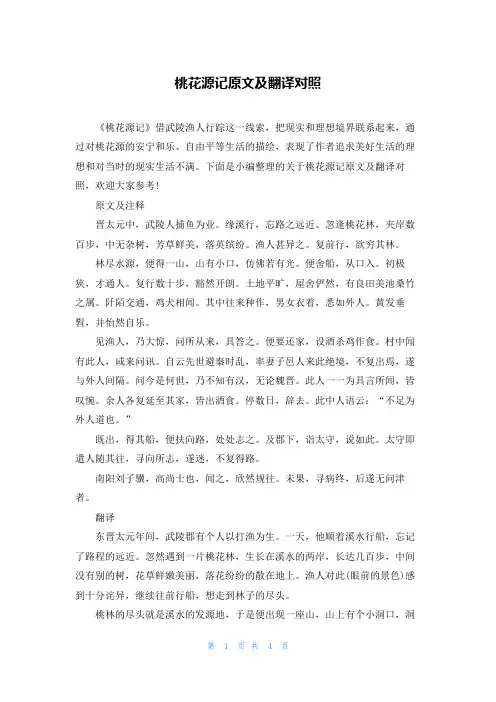
桃花源记原文及翻译对照《桃花源记》借武陵渔人行踪这一线索,把现实和理想境界联系起来,通过对桃花源的安宁和乐、自由平等生活的描绘,表现了作者追求美好生活的理想和对当时的现实生活不满。
下面是小编整理的关于桃花源记原文及翻译对照,欢迎大家参考!原文及注释晋太元中,武陵人捕鱼为业。
缘溪行,忘路之远近。
忽逢桃花林,夹岸数百步,中无杂树,芳草鲜美,落英缤纷。
渔人甚异之。
复前行,欲穷其林。
林尽水源,便得一山,山有小口,仿佛若有光。
便舍船,从口入。
初极狭,才通人。
复行数十步,豁然开朗。
土地平旷,屋舍俨然,有良田美池桑竹之属。
阡陌交通,鸡犬相闻。
其中往来种作,男女衣着,悉如外人。
黄发垂髫,并怡然自乐。
见渔人,乃大惊,问所从来,具答之。
便要还家,设酒杀鸡作食。
村中闻有此人,咸来问讯。
自云先世避秦时乱,率妻子邑人来此绝境,不复出焉,遂与外人间隔。
问今是何世,乃不知有汉,无论魏晋。
此人一一为具言所闻,皆叹惋。
余人各复延至其家,皆出酒食。
停数日,辞去。
此中人语云:“不足为外人道也。
”既出,得其船,便扶向路,处处志之。
及郡下,诣太守,说如此。
太守即遣人随其往,寻向所志,遂迷,不复得路。
南阳刘子骥,高尚士也,闻之,欣然规往。
未果,寻病终,后遂无问津者。
翻译东晋太元年间,武陵郡有个人以打渔为生。
一天,他顺着溪水行船,忘记了路程的远近。
忽然遇到一片桃花林,生长在溪水的两岸,长达几百步,中间没有别的树,花草鲜嫩美丽,落花纷纷的散在地上。
渔人对此(眼前的景色)感到十分诧异,继续往前行船,想走到林子的尽头。
桃林的尽头就是溪水的发源地,于是便出现一座山,山上有个小洞口,洞里仿佛有点光亮。
于是他下了船,从洞口进去了。
起初洞口很狭窄,仅容一人通过。
又走了几十步,突然变得开阔明亮了。
(呈现在他眼前的是)一片平坦宽广的土地,一排排整齐的房舍。
还有肥沃的田地、美丽的池沼,桑树竹林之类的。
田间小路交错相通,鸡鸣狗叫到处可以听到。
人们在田野里来来往往耕种劳作,男女的穿戴跟桃花源以外的世人完全一样。
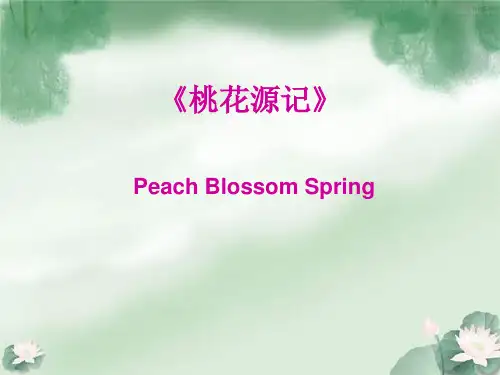
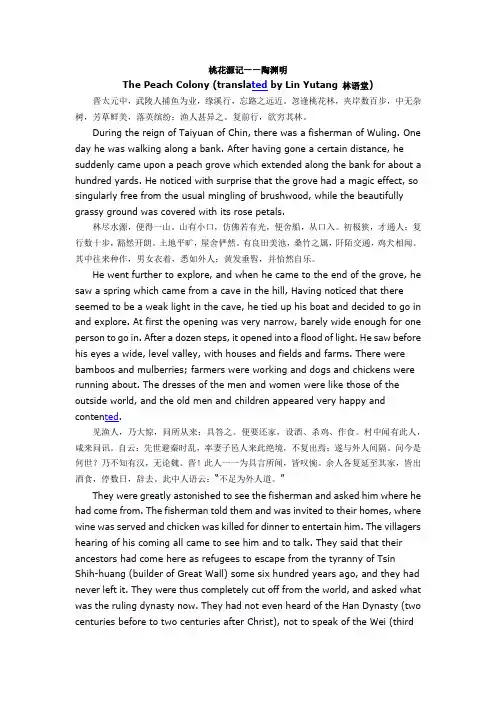
桃花源记——陶渊明The Peach Colony (transla ted by Lin Yutang 林语堂)晋太元中,武陵人捕鱼为业,缘溪行,忘路之远近。
忽逢桃花林,夹岸数百步,中无杂树,芳草鲜美,落英缤纷;渔人甚异之。
复前行,欲穷其林。
During the reign of Taiyuan of Chin, there was a fisherman of Wuling. One day he was walking along a bank. After having gone a certain distance, he suddenly came upon a peach grove which extended along the bank for about a hundred yards. He noticed with surprise that the grove had a magic effect, so singularly free from the usual mingling of brushwood, while the beautifully grassy ground was covered with its rose petals.林尽水源,便得一山。
山有小口,仿佛若有光,便舍船,从口入。
初极狭,才通人;复行数十步,豁然开朗。
土地平旷,屋舍俨然。
有良田美池,桑竹之属,阡陌交通,鸡犬相闻。
其中往来种作,男女衣着,悉如外人;黄发垂髫,并怡然自乐。
He went further to explore, and when he came to the end of the grove, he saw a spring which came from a cave in the hill, Having noticed that there seemed to be a weak light in the cave, he tied up his boat and decided to go in and explore. At first the opening was very narrow, barely wide enough for one person to go in. After a dozen steps, it opened into a flood of light. He saw before his eyes a wide, level valley, with houses and fields and farms. There were bamboos and mulberries; farmers were working and dogs and chickens were running about. The dresses of the men and women were like those of the outside world, and the old men and children appeared very happy andconten ted.见渔人,乃大惊,问所从来;具答之。
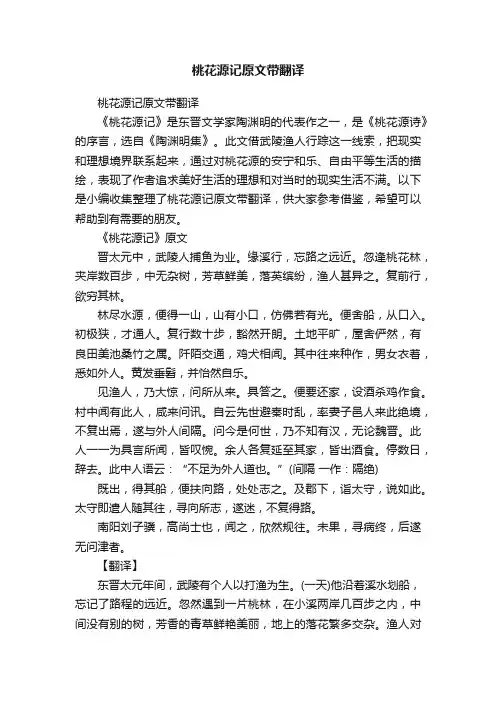
桃花源记原文带翻译桃花源记原文带翻译《桃花源记》是东晋文学家陶渊明的代表作之一,是《桃花源诗》的序言,选自《陶渊明集》。
此文借武陵渔人行踪这一线索,把现实和理想境界联系起来,通过对桃花源的安宁和乐、自由平等生活的描绘,表现了作者追求美好生活的理想和对当时的现实生活不满。
以下是小编收集整理了桃花源记原文带翻译,供大家参考借鉴,希望可以帮助到有需要的朋友。
《桃花源记》原文晋太元中,武陵人捕鱼为业。
缘溪行,忘路之远近。
忽逢桃花林,夹岸数百步,中无杂树,芳草鲜美,落英缤纷,渔人甚异之。
复前行,欲穷其林。
林尽水源,便得一山,山有小口,仿佛若有光。
便舍船,从口入。
初极狭,才通人。
复行数十步,豁然开朗。
土地平旷,屋舍俨然,有良田美池桑竹之属。
阡陌交通,鸡犬相闻。
其中往来种作,男女衣着,悉如外人。
黄发垂髫,并怡然自乐。
见渔人,乃大惊,问所从来。
具答之。
便要还家,设酒杀鸡作食。
村中闻有此人,咸来问讯。
自云先世避秦时乱,率妻子邑人来此绝境,不复出焉,遂与外人间隔。
问今是何世,乃不知有汉,无论魏晋。
此人一一为具言所闻,皆叹惋。
余人各复延至其家,皆出酒食。
停数日,辞去。
此中人语云:“不足为外人道也。
”(间隔一作:隔绝) 既出,得其船,便扶向路,处处志之。
及郡下,诣太守,说如此。
太守即遣人随其往,寻向所志,遂迷,不复得路。
南阳刘子骥,高尚士也,闻之,欣然规往。
未果,寻病终,后遂无问津者。
【翻译】东晋太元年间,武陵有个人以打渔为生。
(一天)他沿着溪水划船,忘记了路程的远近。
忽然遇到一片桃林,在小溪两岸几百步之内,中间没有别的树,芳香的青草鲜艳美丽,地上的落花繁多交杂。
渔人对此感到十分奇怪。
便继续往前走,想要走到林子的尽头。
桃林的尽头就是溪水的源头,渔人发现了一座小山,山上有个小洞口,洞里隐隐约约的好像有点光亮。
(渔人)便舍弃了船,从洞口进去。
最初,山洞很狭窄,只容一个人通过;又走了几十步,突然变得开阔明亮了。
(呈现在渔人眼前的是)一片平坦宽广的土地,一排排整齐的房舍,还有肥沃的田地、美丽的池塘,有桑树、竹林这类的植物。
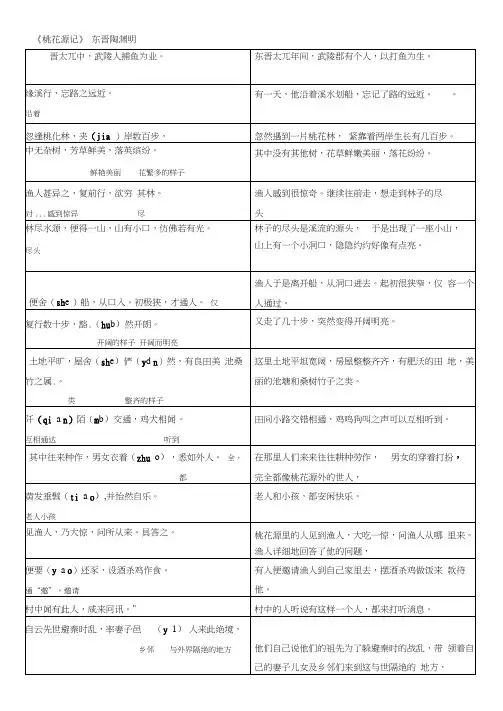
作者在本文中描写的世外桃源有何用意?表达了对理想社会的热烈追求,同时也含蓄地表达了对社会现实的不满作者生活的时代,赋役繁重,战乱纷起,但文中描绘的却是另外一番图景,这寄寓了他什么样的愿望?“没有剥削压迫,没有战乱,生活安定富足”“率妻子邑人来此绝境”的原因是什么?“先世避秦时乱”桃源人嘱咐渔人“不足为外人道”的原因是什么?他们不愿外界干扰破坏桃花源的宁静和谐的生活,也暗示外人是找不到桃花源的。
作者把桃花源美景写得真切动人,有声有色,但又有几分迷离恍惚,如:“________ ”仿佛若有光、与外人间隔、不足为外人道、不复得路、后遂无问津者本文的线索是什么?围绕这一线索,作者写了哪几件事?渔人的行踪逢桃林、访桃源、寻桃源渔人“欲穷其林“原因是:忽逢桃花林,夹岸数百步,中无杂树,芳草鲜美,落英缤纷,渔人甚异之文中描写桃花源中人精神状态的句子是:黄发垂髫,并怡然自乐文中哪些话表明桃源人听了渔人的话之后,仍想继续在桃花源中生活?他们为什么不愿离开?不足为外人道也(1)源中生活安宁,(2)能安居乐业,(3)和睦相处陶渊明在《桃花源诗》中有“嬴氏乱天纪,贤者避其世”的诗句,文中哪句话与其表达的意思相近?自云先世避秦时乱,率妻子邑人来此绝境根据选段内容,在下面的空格处填入适当的成语(4分)欲脱尘网,陶渊明志寄□口□口;世外桃源□ □口□,欧阳修情醉滁西琅琊与民同乐成语皆言简意赅,许多成语都语出有典,如成语,就是浓缩本文的故事而来,意思是世外桃源比喻不受外界影响的地方或理想中的脱离现实的美好场所或境地或环境幽美的地方渔人偶遇桃源,“处处志之”,最终却“不复得路”,其中寄寓了作者怎样的思想?寄寓了作者对美好的理想社会的追求,以及在当时社会条件下理想无法实现的矛盾思想“桃源”即代表了他心目中的理想社会,文中的渔人虽“处处志之” ,但终“不复得路”,暗示了桃源并不存在,这样的理想无法实现根据本文内容,恰当选用文中的四字短语填空(2分)武陵渔人“忘路之远近”,发现了桃花林,甚是好奇,就“欲穷其林”进入桃花源,他感到桃花源人的生活是那么“怡然自乐”离开桃花源时,他“处处志之”,但再来寻找时还是“不复得路”“黄发垂髫”分别指代什么人?“黄发垂髫,并怡然自乐”展现出一幅怎样的生活图景?“黄发垂髫”分别指代老人和小孩。
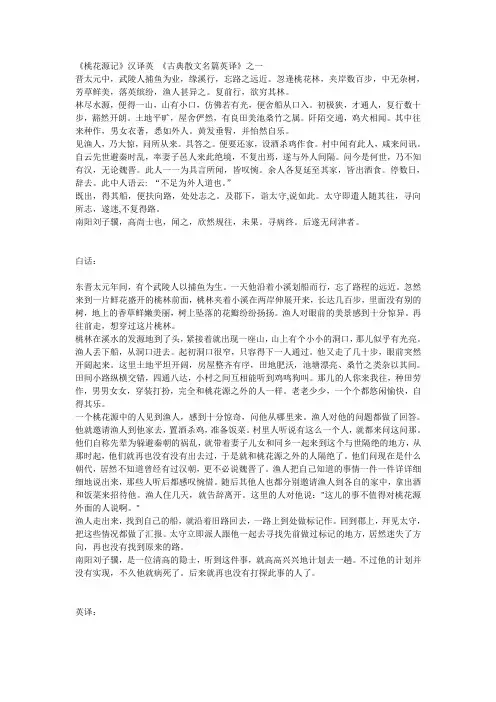
《桃花源记》汉译英《古典散文名篇英译》之一晋太元中,武陵人捕鱼为业,缘溪行,忘路之远近。
忽逢桃花林,夹岸数百步,中无杂树,芳草鲜美,落英缤纷,渔人甚异之。
复前行,欲穷其林。
林尽水源,便得一山,山有小口,仿佛若有光,便舍船从口入。
初极狭,才通人,复行数十步,豁然开朗。
土地平旷,屋舍俨然,有良田美池桑竹之属。
阡陌交通,鸡犬相闻。
其中往来种作,男女衣著,悉如外人。
黄发垂髫,并怡然自乐。
见渔人,乃大惊,问所从来。
具答之。
便要还家,设酒杀鸡作食。
村中闻有此人,咸来问讯。
自云先世避秦时乱,率妻子邑人来此绝境,不复出焉,遂与外人间隔。
问今是何世,乃不知有汉,无论魏晋。
此人一一为具言所闻,皆叹惋。
余人各复延至其家,皆出酒食。
停数日,辞去。
此中人语云: “不足为外人道也。
”既出,得其船,便扶向路,处处志之。
及郡下,诣太守,说如此。
太守即遣人随其往,寻向所志,遂迷,不复得路。
南阳刘子骥,高尚士也,闻之,欣然规往,未果。
寻病终。
后遂无问津者。
白话:东晋太元年间,有个武陵人以捕鱼为生。
一天他沿着小溪划船而行,忘了路程的远近。
忽然来到一片鲜花盛开的桃林前面,桃林夹着小溪在两岸伸展开来,长达几百步,里面没有别的树,地上的香草鲜嫩美丽,树上坠落的花瓣纷纷扬扬。
渔人对眼前的美景感到十分惊异。
再往前走,想穿过这片桃林。
桃林在溪水的发源地到了头,紧接着就出现一座山,山上有个小小的洞口,那儿似乎有光亮。
渔人丢下船,从洞口进去。
起初洞口很窄,只容得下一人通过。
他又走了几十步,眼前突然开阔起来。
这里土地平坦开阔,房屋整齐有序,田地肥沃,池塘漂亮、桑竹之类杂以其间。
田间小路纵横交错,四通八达,小村之间互相能听到鸡鸣狗叫。
那儿的人你来我往,种田劳作,男男女女,穿装打扮,完全和桃花源之外的人一样。
老老少少,一个个都悠闲愉快,自得其乐。
一个桃花源中的人见到渔人,感到十分惊奇,问他从哪里来。
渔人对他的问题都做了回答。
他就邀请渔人到他家去,置酒杀鸡,准备饭菜。
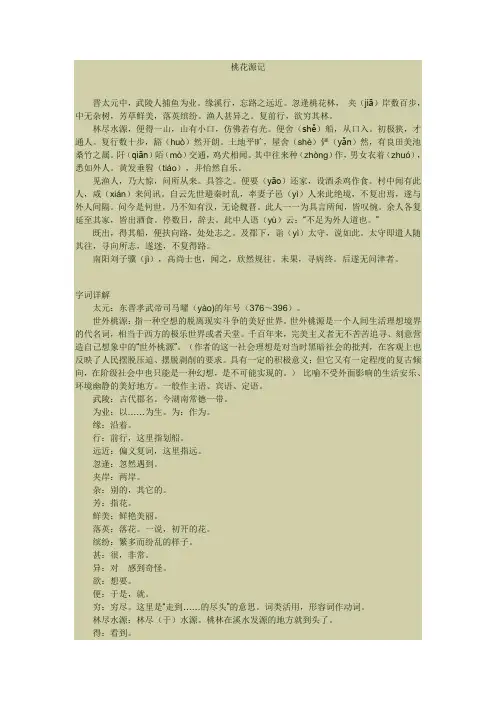
桃花源记晋太元中,武陵人捕鱼为业。
缘溪行,忘路之远近。
忽逢桃花林,夹(jiā)岸数百步,中无杂树,芳草鲜美,落英缤纷。
渔人甚异之。
复前行,欲穷其林。
林尽水源,便得一山,山有小口,仿佛若有光。
便舍(shě)船,从口入。
初极狭,才通人。
复行数十步,豁(huò)然开朗。
土地平旷,屋舍(shè)俨(yǎn)然,有良田美池桑竹之属。
阡(qiān)陌(mò)交通,鸡犬相闻。
其中往来种(zhòng)作,男女衣着(zhuó),悉如外人。
黄发垂髫(tiáo),并怡然自乐。
见渔人,乃大惊,问所从来。
具答之。
便要(yāo)还家,设酒杀鸡作食。
村中闻有此人,咸(xián)来问讯。
自云先世避秦时乱,率妻子邑(yì)人来此绝境,不复出焉,遂与外人间隔。
问今是何世,乃不知有汉,无论魏晋。
此人一一为具言所闻,皆叹惋。
余人各复延至其家,皆出酒食。
停数日,辞去。
此中人语(yù)云:“不足为外人道也。
”既出,得其船,便扶向路,处处志之。
及郡下,诣(yì)太守,说如此。
太守即遣人随其往,寻向所志,遂迷,不复得路。
南阳刘子骥(jì),高尚士也,闻之,欣然规往。
未果,寻病终。
后遂无问津者。
字词详解太元:东晋孝武帝司马曜(yào)的年号(376~396)。
世外桃源:指一种空想的脱离现实斗争的美好世界。
世外桃源是一个人间生活理想境界的代名词,相当于西方的极乐世界或者天堂。
千百年来,完美主义者无不苦苦追寻、刻意营造自己想象中的“世外桃源”。
(作者的这一社会理想是对当时黑暗社会的批判,在客观上也反映了人民摆脱压迫、摆脱剥削的要求。
具有一定的积极意义;但它又有一定程度的复古倾向,在阶级社会中也只能是一种幻想,是不可能实现的。
)比喻不受外面影响的生活安乐、环境幽静的美好地方。
一般作主语、宾语、定语。
武陵:古代郡名。
今湖南常德一带。
为业:以……为生。
《桃花源记》翻译各位读友大家好,此文档由网络收集而来,欢迎您下载,谢谢篇一:桃花源记英文翻译桃花源记英文翻译桃花源记——东晋陶渊明晋太元中,武陵人捕鱼为业。
缘溪行,忘路之远近。
忽逢桃花林,夹岸数百步,中无杂树,芳草鲜美,落英缤纷。
渔人甚异之。
复前行,欲穷其林。
林尽水源,便得一山,山有小口,仿佛若有光。
便舍船,从口入。
初极狭,才通人。
复行数十步,豁然开朗。
土地平旷,屋舍俨然,有良口美池桑竹之属。
阡陌交通,鸡犬相闻。
其中往来种作,男女衣着,悉如外人。
黄发垂髫并恰然自乐。
见渔人,乃大惊,问所从来。
具答之。
便要还家,设酒杀鸡作食。
村中闻有人,咸来问讯。
自云先世避秦时乱,率妻子邑人来此绝境,不复出焉,遂与外人间。
问今是何世,乃不知有汉,无论魏晋。
此人—一为具言所闻,皆叹惋。
余人各复延其家,皆出酒食。
停数日,辞去。
此中人语云:“不足为外人道也。
”既出,得其船,便扶向路,处处志之。
及郡下,诣太守,说如此。
太守即遣人随其往,寻向所志,遂迷,不复得路。
南阳刘子骥,高尚士也,闻之,欣然现往。
未果,寻病终。
后遂无问津者。
《桃花源记》(翻译)东晋太元年间,(有个)武陵人靠捕鱼谋生。
(有一天)他顺着小溪划船,忘了路程的远近。
忽然遇到(一片)桃花林,(桃树)夹在溪流两岸,长达几百步,中间没有别的树。
(地上)芳草鲜艳美丽,落花纷纷。
渔人非常诧异。
再往前走,想走到这林子的尽头。
(桃)林在溪水发源的地方就没有了,(紧接着)就是一座山,山上有个小洞口,(里面)好像有光似的。
(渔人)就离了船,从洞口进去。
初进时,洞口很窄,仅容一个人通过。
又走了几十步,突然(变得)开阔敞亮了。
(这里)土地平坦开阔,房舍整整齐齐,有肥沃的田地、美好的池塘和桑树竹子之类。
田间小路,交错相通,(村落间)能听见鸡鸣狗叫的声音。
人们来来往往耕田劳作,男女的穿戴,完全像桃花源以外的世人。
老人和小孩都充满喜悦之情,显得心满意足。
(那里面的人)见了渔人,竟大吃一惊,问(渔人)从哪里来,(渔人)详尽地回答了他。
《桃花源记》翻译晋太元中,武陵人捕鱼为业。
东晋太元年间,武陵郡有个人,以打鱼为生。
缘溪行,忘路之远近。
沿着小溪划行,忘记了路途的远近。
忽逢桃花林,夹岸数百步。
忽然遇到一片桃花林,夹着桃林两岸有几百步。
中无杂树,芳草鲜美,落英缤纷。
其中没有其他树。
鲜花和嫩草鲜艳美丽,落花繁多。
渔人甚异之,复前行,渔人对眼前的景象感到诧异,又向前划行,欲穷其林。
林尽水源,想要走完桃花林。
桃林在溪水发源的地方就到头了,便得一山,山有小口,仿佛若有光。
就看到了一座山,山上有一个小洞口,隐隐约约有光便舍船,从口入。
渔人于是舍弃船,从洞口进去。
初极狭,才通人。
起初很狭窄,仅容一个人通过。
复行数十步,豁然开朗。
又走了几十步,突然变得开阔明亮。
土地平旷,屋舍俨然土地平坦宽阔,房屋整整齐齐的样子有良田美池桑竹之属。
有肥沃的田地,美丽的池塘和桑园和竹林这类食物。
阡陌交通,鸡犬相闻。
田间小路交错相通,鸡鸣狗叫之声可以互相听到。
其中往来种作,男女衣着,那中间的人来来往往耕种劳作,男女的衣着穿戴,悉如外人。
黄发垂髫,并怡然自乐。
都像桃花源外的世人,老人和小孩都安适愉快的样子见渔人,乃大惊,(桃花源里的人)见到渔人,竟然十分吃惊问所从来。
具答之。
问渔人从哪里来。
渔人详细地回答了问题。
便要还家,设酒杀鸡作食。
有人便邀请渔人到自己家里去,摆酒杀鸡来款待他村中闻有此人,咸来问讯。
村中的人听说有这样一个人,都来询问打探消息。
自云先世避秦时乱,他们自己说他们的祖先为了躲避秦时的战乱,率妻子邑人来此绝境带领着自己的妻儿及乡邻们来到这与世隔绝的地方不复出焉,遂与外人隔绝。
不再从这里出去,于是就与外面的人断绝了来往问今是何世,乃不知有汉,桃花源里的人问现在是什么朝代,竟然不知道有汉朝无论魏晋。
更不必说魏朝和晋朝了。
此人一一为具言所闻,渔人把自己听到的事一一详细地告诉了他们皆叹惋。
村中的人都感叹惋惜余人各复延至其家,其余的人又各自把渔人请到自己的家中,皆出酒食。
《桃花源记》全文翻译《桃花源记》全文翻译《桃花源记》是东晋文学家陶渊明的代表作之一,是《桃花源诗》的序言,选自《陶渊明集》。
下面是小编精心整理的《桃花源记》全文翻译,欢迎阅读,希望大家能够喜欢。
晋太元中,武陵人捕鱼为业。
东晋太元年间,武陵郡有个人,以打鱼为生。
缘溪行,忘路之远近。
沿着小溪划行,忘记了路途的远近。
忽逢桃花林,夹岸数百步。
忽然遇到一片桃花林,夹着桃林两岸有几百步。
中无杂树,芳草鲜美,落英缤纷。
其中没有其他树。
鲜花和嫩草鲜艳美丽,落花繁多。
渔人甚异之,复前行,渔人对眼前的景象感到诧异,又向前划行,欲穷其林。
林尽水源,想要走完桃花林。
桃林在溪水发源的地方就到头了,便得一山,山有小口,仿佛若有光。
就看到了一座山,山上有一个小洞口,隐隐约约有光便舍船,从口入。
渔人于是舍弃船,从洞口进去。
初极狭,才通人。
起初很狭窄,仅容一个人通过。
复行数十步,豁然开朗。
又走了几十步,突然变得开阔明亮。
土地平旷,屋舍俨然土地平坦宽阔,房屋整整齐齐的样子有良田美池桑竹之属。
有肥沃的田地,美丽的池塘和桑园和竹林这类食物。
阡陌交通,鸡犬相闻。
田间小路交错相通,鸡鸣狗叫之声可以互相听到。
其中往来种作,男女衣着,那中间的人来来往往耕种劳作,男女的衣着穿戴, 悉如外人。
黄发垂髫,并怡然自乐。
都像桃花源外的世人,老人和小孩都安适愉快的样子见渔人,乃大惊,(桃花源里的人)见到渔人,竟然十分吃惊问所从来。
具答之。
问渔人从哪里来。
渔人详细地回答了问题。
便要还家,设酒杀鸡作食。
有人便邀请渔人到自己家里去,摆酒杀鸡来款待他村中闻有此人,咸来问讯。
村中的人听说有这样一个人,都来询问打探消息。
自云先世避秦时乱,他们自己说他们的祖先为了躲避秦时的战乱,率妻子邑人来此绝境带领着自己的妻儿及乡邻们来到这与世隔绝的地方不复出焉,遂与外人隔绝。
不再从这里出去,于是就与外面的人断绝了来往问今是何世,乃不知有汉,桃花源里的人问现在是什么朝代,竟然不知道有汉朝无论魏晋。
桃花源记(双语)A Tale of the Fountain of the Peach Blossom Spring作者: Jonathan Hu翻译晋太元中,武陵人捕鱼为业;缘溪行,忘路之远近。
忽逢桃花林。
夹岸数百步,中无杂树,芳草鲜美,落英缤纷,渔人甚异之。
复前行,欲穷其林。
In the year of Taiyuan of the Jin Dynasty, there lived a man in Wuling jun who earned his living by fishing. One day, he rowed his boat along a stream, unaware of how far he had gone when all of a sudden, he found himself in the midst of a wood full of peach blossoms. The wood extended several hundred footsteps along both banks of the stream. There were no trees of other kinds. The lush grass was fresh and beautiful and peach petals fell in riotous profusion. The fisherman was so curious that he rowed on, in hopes of discovering where the trees ended.林尽水源,便得一山。
山有小口,仿佛若有光,便舍船从口入。
初极狭,才通人。
复行数十步,豁然开朗。
土地平旷,屋舍俨然,有良田、美池、桑竹之属,阡陌交通,鸡犬相闻。
其中往来种作,男女衣着,悉如外人;黄发垂髫,并怡然自乐。
At the end of the wood was the fountainhead of the stream. The fisherman beheld a hill, with a small opening from which issued a glimmer of light. He stepped ashore to explore the crevice. His first steps took him into a passage that accommodated only the width of one person. After he progressed about scores of paces, it suddenly widened into an open field. The land was flat and spacious. There were houses arranged in good order with fertile fields, beautiful ponds, bamboo groves, mulberry trees and paths crisscrossing the fields in all directions. The crowing of cocks and the barking of dogs were within everyone's earshot. In the fields the villagers were busy with farm work. Men and women were dressed like people outside. They all, old and young, appeared happy.见渔人,乃大惊,问所从来,具答之。
桃花源记晋太元中,武陵人捕鱼为业。
缘溪行,忘路之远近。
忽逢桃花林,夹(jiā)岸数百步,中无杂树,芳草鲜美,落英缤纷。
渔人甚异之。
复前行,欲穷其林。
林尽水源,便得一山,山有小口,仿佛若有光。
便舍(shě)船,从口入。
初极狭,才通人。
复行数十步,豁(huò)然开朗。
土地平旷,屋舍(shè)俨(yǎn)然,有良田美池桑竹之属。
阡(qiān)陌(mò)交通,鸡犬相闻。
其中往来种(zhòng)作,男女衣着(zhuó),悉如外人。
黄发垂髫(tiáo),并怡然自乐。
见渔人,乃大惊,问所从来。
具答之。
便要(yāo)还家,设酒杀鸡作食。
村中闻有此人,咸(xián)来问讯。
自云先世避秦时乱,率妻子邑(yì)人来此绝境,不复出焉,遂与外人间隔。
问今是何世,乃不知有汉,无论魏晋。
此人一一为具言所闻,皆叹惋。
余人各复延至其家,皆出酒食。
停数日,辞去。
此中人语(yù)云:“不足为外人道也。
”既出,得其船,便扶向路,处处志之。
及郡下,诣(yì)太守,说如此。
太守即遣人随其往,寻向所志,遂迷,不复得路。
南阳刘子骥(jì),高尚士也,闻之,欣然规往。
未果,寻病终。
后遂无问津者。
字词详解太元:东晋孝武帝司马曜(yào)的年号(376~396)。
世外桃源:指一种空想的脱离现实斗争的美好世界。
世外桃源是一个人间生活理想境界的代名词,相当于西方的极乐世界或者天堂。
千百年来,完美主义者无不苦苦追寻、刻意营造自己想象中的“世外桃源”。
(作者的这一社会理想是对当时黑暗社会的批判,在客观上也反映了人民摆脱压迫、摆脱剥削的要求。
具有一定的积极意义;但它又有一定程度的复古倾向,在阶级社会中也只能是一种幻想,是不可能实现的。
)比喻不受外面影响的生活安乐、环境幽静的美好地方。
一般作主语、宾语、定语。
武陵:古代郡名。
今湖南常德一带。
为业:以……为生。
为:作为。
缘:沿着。
行:前行,这里指划船。
远近:偏义复词,这里指远。
忽逢:忽然遇到。
夹岸:两岸。
杂:别的,其它的。
芳:指花。
鲜美:鲜艳美丽。
落英:落花。
一说,初开的花。
缤纷:繁多而纷乱的样子。
甚:很,非常。
异:对···感到奇怪。
欲:想要。
便:于是,就。
穷:穷尽。
这里是“走到……的尽头”的意思。
词类活用,形容词作动词。
林尽水源:林尽(于)水源。
桃林在溪水发源的地方就到头了。
得:看到。
仿佛:隐隐约约,形容看的不真切的样子。
若:好像。
舍:离开。
初:开始。
才:副词,仅仅,刚刚。
才通人:仅容一人通过。
通:通过。
豁然开朗:豁然:形容开阔敞亮的意思;开朗:地方开阔;光线充足、明亮。
指一下子出现了开阔明亮的境界。
现在形容一下子明白了某种道理;心情十分舒畅。
(总意)形容由狭窄幽暗突然变得开阔明亮的样子。
也形容对某一问题从长期思索不解而后忽然领悟。
一般作谓语、宾语、定语。
舍:房屋。
平:平坦。
旷:宽阔。
俨(yǎn)然:整齐的样子。
之:这。
属:类。
阡陌交通:田间小路交错相通。
阡陌,田间小路,南北走向的叫阡,东西走向的叫陌。
交通,交错相通鸡犬相闻:(村落间)鸡鸣狗叫的声音,彼此都可以听得见。
相闻,可以互相听到。
其:那。
种作:耕田劳作。
着:穿着。
悉:都。
外人:桃花源以外的世人。
黄发垂髫(tiáo):指老人和小孩。
垂髫,垂下来的头发,这里指小孩子。
黄发,旧指长寿的特征,这指老人。
并:表承接(顺接),而且。
怡然:愉快的样子。
乃(乃大惊的乃):副词,竟,竟然。
大:很,非常。
从来:从……地方来。
具:详细、详尽。
之:代词,指代桃源人所问问题。
要(yāo):通“邀”,邀请。
咸:副词,都,全问讯:询问消息。
语:(yù)向.........人说,告诉云:说。
先世:祖先。
妻子:指妻子、儿女。
邑人:同乡的人。
绝境:与人世隔绝的地方。
复:再,又。
焉:兼语词,从这里。
相当于“于之”,“于此”。
间隔:断绝来往。
今:现在。
乃(乃不知有汉的乃):竟然。
无论:更不用说,(更)不必说。
叹惋:感叹,惋惜。
延至:邀请到。
延,邀请。
为:无义。
具言:详细地说。
(所+动词构成名词性结构)具:详细。
停:待。
辞去:辞别离开。
语:对……说。
不足:不必,不值得。
为:向、对。
道:说。
既:已经;······之后。
得:找到。
便扶向路:就顺着原来的路回去。
扶:沿、顺着。
向:从前的,旧的。
处处志之:处处都做了记号。
志:动词,作标记。
及:到了。
郡下:指武陵郡城下。
诣:到,拜访。
特指到尊长那里去。
说如此:说明了像这种情况。
如此,判断句,像这样即:立即。
遣:派遣。
寻向所志:寻找以前所做的标记。
所志,所做的标记。
志:做的标记。
(名词性)所单独可不翻译。
遂:竟然。
复:又,再。
得:取得,获得,文中是找到的意思。
南阳:郡名,治所在现在河南南阳。
刘子骥:即刘驎之,字子骥,东晋南阳(今河南南阳)人。
《晋书·隐逸传》里说他“好游山泽”。
高尚:品德高尚。
欣然:高兴的样子。
规:计划,打算。
寻:随即,不久。
未果:没有结果,意思是没有实现。
果:实现。
问津:本指打听渡口,这里是访求寻找的意思。
津,渡口。
译文东晋太元年间,有个武陵人靠捕鱼为生。
(一次渔人)沿着小溪划船,往前行,忘记了路程多远。
忽然遇到一片桃花林,溪水两岸几百步以内,中间没有别的树木,花和草鲜嫩美丽,地上的落花繁多。
渔人对此感到非常惊异。
(渔人)又向前划去,想走到那片林子的尽头。
桃花林在溪水发源的地方没有了,(在那里)便看到一座山,山边有个小洞,隐隐约约好像有光亮。
渔人就舍弃船上岸,从小洞口进入。
起初洞口很狭窄,仅能容一个人通过。
渔人又向前走了几十步,一下子变得开阔敞亮了。
只见土地平坦宽阔,房屋整整齐齐,有肥沃的土地,美好的池塘,桑树竹林之类。
田间小路交错相通,(村落间)能互相听到鸡鸣狗叫的声音。
村里面,来来往往的行人,耕种劳作的人,男男女女的衣着装束完全像桃花源外的世人,老人和小孩都高高兴兴,自得其乐。
(桃花源的人)一见渔人,竟然大为惊奇,问他是从哪里儿来的。
(渔人)细致详尽地回答了他们,人们就把渔人请到自己家里,摆酒杀鸡做饭款待他。
村里人听说来了这么一个客人,都来打听消息。
(他们)自己说他们的祖先(为了)躲避秦时的战乱,率领妻子儿女和同乡人来到这个与外界隔绝的地方,不再出去了,于是就同外界的人隔绝了。
他们问(渔人)现在是什么朝代,(他们)竟然不知道有汉朝,更不必说魏朝和晋朝了。
这个渔人一一的给(桃花源中的人)详细地诉说他知道的事情,(他们)听了都很惊叹惋惜。
其余的人又各自邀请渔人到他们家里,都拿出酒菜饭食来款待他。
渔人居住了几天,告辞离开。
这里面的人告诉他说:“(这里的情况)不值得对外界的人说啊!”(渔人)出来后,找到了他的船,就沿着先前的路回去,(一路上)处处标上记号。
渔人到了武陵郡,便去拜见太守,把这些情况作了禀报。
太守立即派人随同他前往,寻找先前所做的记号,结果迷了路,再也找不到通向桃花源的路了。
南阳有个刘子骥,是位清高的隐士,听到这个消息,兴致勃勃地打算前往桃花源。
没有实现,不久就病死了。
以后就不再有探访的人了。
The Peach ColonyTr. by Lin Yutang 林语堂(An Idyllic Land at the End of the Peach Grove)During the reign of Taiyuan of Chin, there was a fisherman of Wuling. One day he was walking along a bank. After having gone a certain distance, he suddenly came upon a peach grove which extended along the bank for about a hundred yards. He noticed with surprise that the grove had a magic effect, so singularly free from the usual mingling of brushwood, while the beautiful grassy ground was covered with its rose petals. He went further to explore, and when he came to the end of the grove, he saw a spring which came from a cave in the hill. Having noticed that there seemed to be a weak light in the cave, he tied up his boat and decided to go in and explore. At first the opening was very narrow, barely wide enough for one person to go in. After a dozen steps, it opened into a flood of light. He saw before his eyes a wide, level valley, with houses and fields and farms. There were bamboos and mulberries; farmers were working and dogs and chickens were running about. The dresses of the men and women were like those of the outside world, and the old men and children appeared very happy and contented.They were greatly astonished to see the fisherman and asked him where he had come from. The fisherman told them and was invited to their homes, where wine was served and chicken waskilled for dinner to entertain him. The villagers hearing of his coming all came to see him and to talk. They said that their ancestors had come here as refugees to escape from the tyranny of Tsin Shih-huang (builder of Great Wall) some six hundred years ago, and they had never left it. They were thus completely cut off from the world, and asked what was the ruling dynasty now. They had not even heard of the Han Dynasty (two centuries before to two centuries after Christ), not to speak of the Wei (third century A.D.) and the Chin (third and fourth centuries). The fisherman told them, which they heard with great amazement. Many of the other villagers then began to invite him to their homes by turn and feed him dinner and wine. After a few days, he took leave of them and left. The villagers begged him not to tell the people outside about their colony.The man found his boat and came back, marking with signs the route he had followed. He went to the magistrate's office and told the magistrate about it. The latter sent someone to go with him and find the place. They looked for the signs but got lost and could never find it again.Liu Tsechi of Nanyang was a great idealist. He heard of this story, and planned to go and find it, but was taken ill and died before he could fulfill his wish. Since then, no one has gone in search of this place.The Peach Blossom SpringTr. by James Robert HightowerDuring the Tai-yuan period of the China dynasty a fisherman of Wu-ling once rowed upstream, unmindful of the distance he had gone, when he suddenly came to a grove of peach trees in bloom. For several hundred paces on both banks of the stream there was no other kind of tree. The wild flowers growing under them were fresh and lovely, and fallen petals covered the ground—it made a great impression on the fisher-man. He went on far away with the idea of finding out how far the grove extended.It came to an end at the foot of a mountain whence issued the spring that supplied the streams. There was a small opening in the mountain and it seemed as though light was coming through it. The fisherman left his boat and entered the cave, which at first was extremely narrow, barely admitting his body, after a few dozen steps it suddenly opened out onto a broad and level plain where well-built houses were surrounded by rich fields and pretty ponds. Mulberry, bamboo and other trees and plants grew there, and criss-cross paths skirted the fields. The sounds of cocks crowing and dogs barking could be heard from one courtyard to the next. Men and women were coming and going about their work in the fields. The clothes they wore were like those of ordinary people. Old men and boys were carefree and happy.When they caught sight of the fisherman, they asked in surprise how he had got there. The fisherman told the whole story, and was invited to go to their house, where he was served wine while they killed a chicken for a feast. When the other villagers heard about the fisherman’s arrival, they all came to pay him a visit. They told him that their ancestors had fled the disorders of Ch'in times and, having taken refugee here with their wives and children and neighbours, had never ventured out again. Consequently they had lost all contact with the outside world. Theyasked what the present ruling dynasty was, for they had never heard of Han, let alone Wei and Jin. They sighed unhappily as the fisherman enumerated the dynasties one by one and recounted the vicissitudes of each.The visitors all asked him to come to their houses in turn, and at every house he had wine and food. He stayed several days. As he was about to go away, the p eople said, "There’s' no need to mention our existence to outsiders.” After the fisherman had gone out and recovered his boat, he carefully marked the route. On reaching the city, he reported what he had found to the magistrate, who at once sent a man to follow him back to the place. They proceeded according to the marks he had made, but went astray and were unable to find the cave again.A high-minded gentleman of Nan-yang named LiuTzu-chi heard the story and happily made preparations to go there, but before he could leave he fell sick and died. Since then, there has been no one interested in trying to find such a place.。